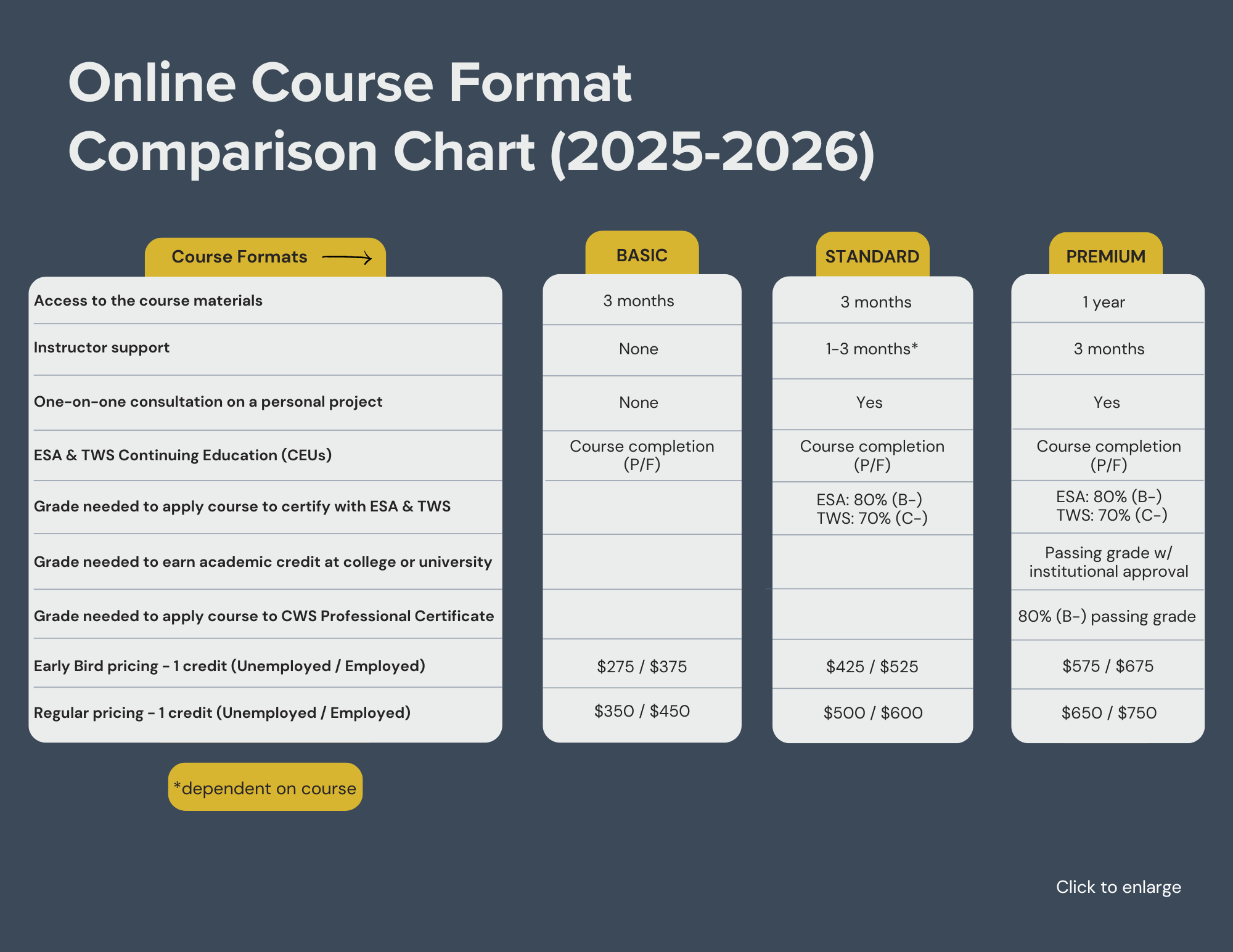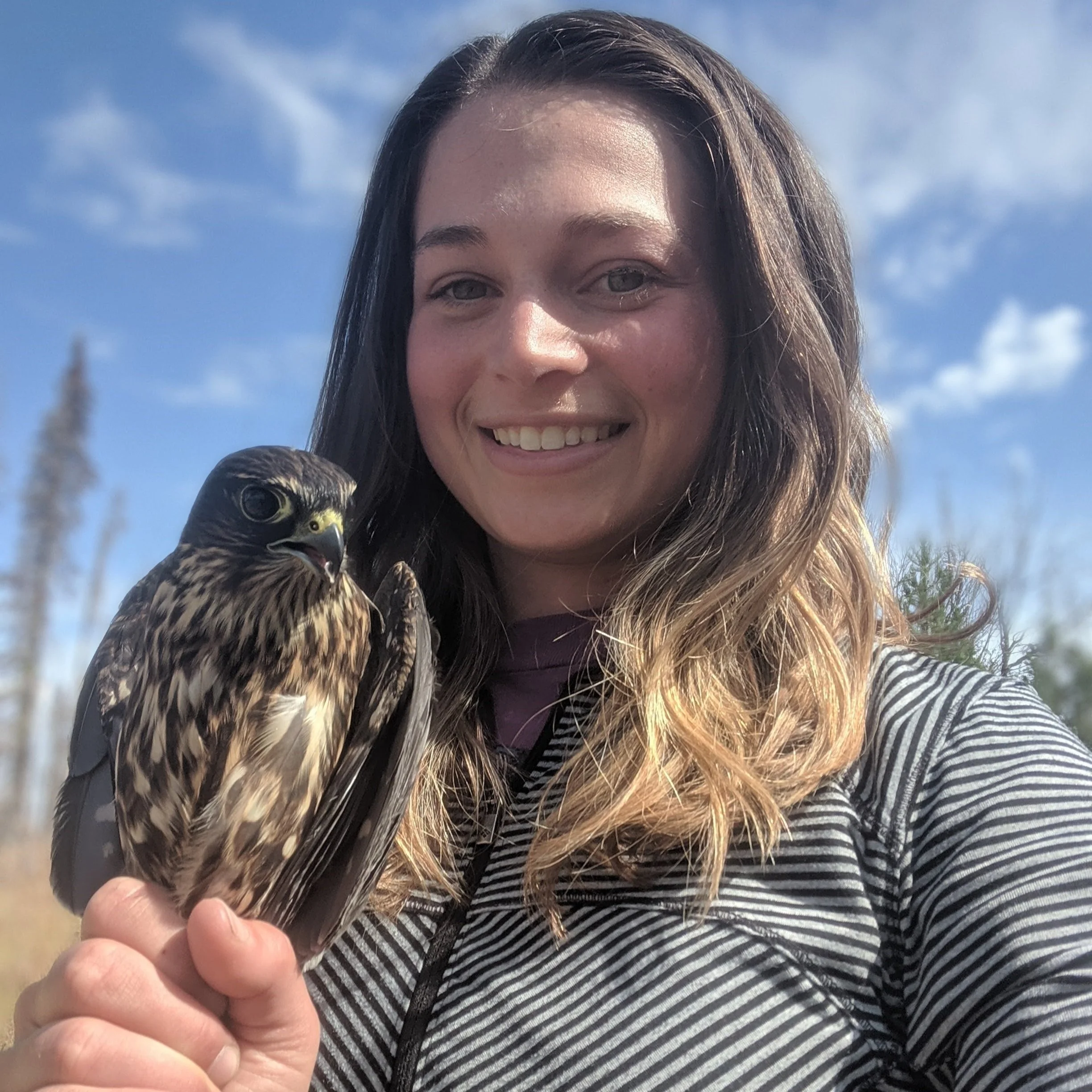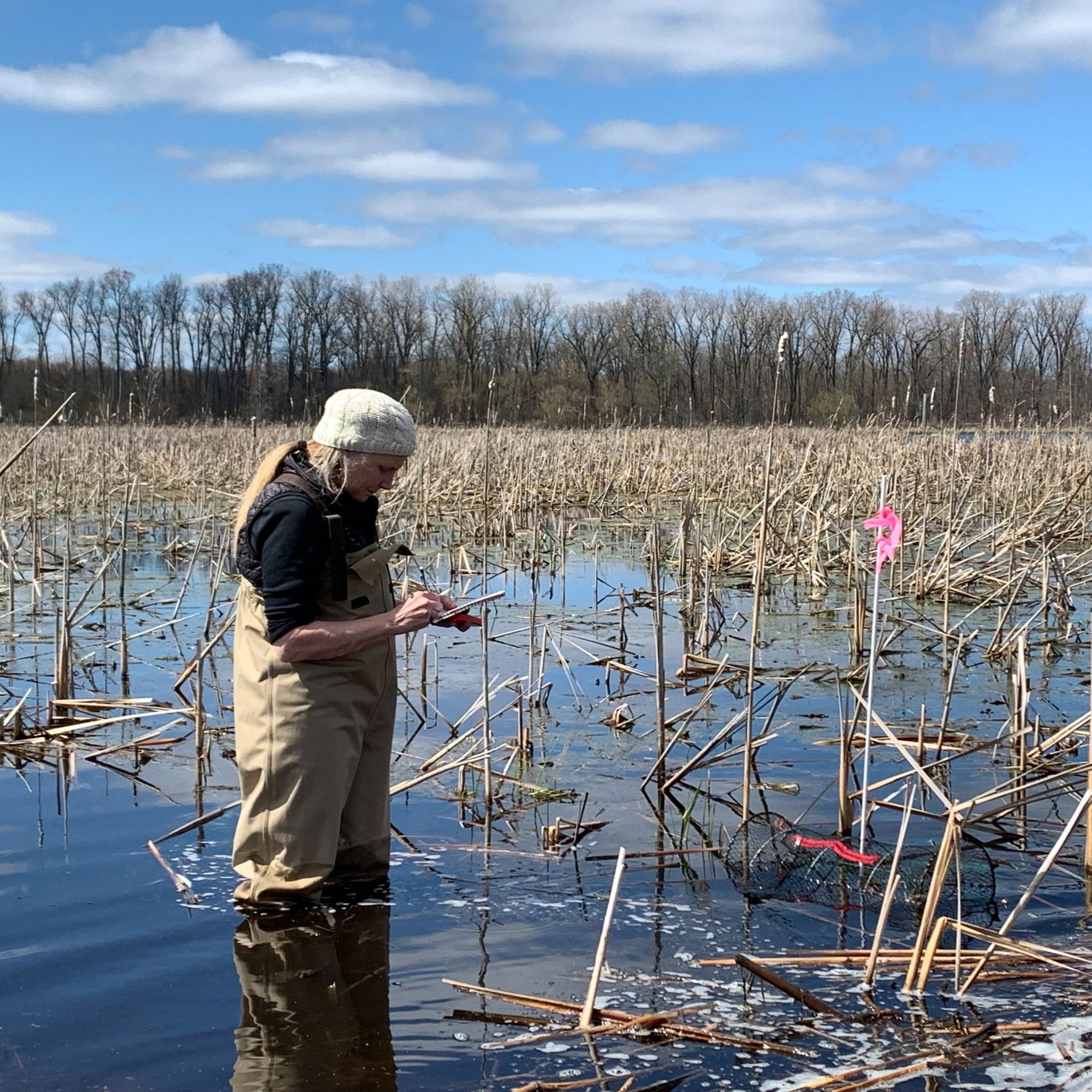-
Learn the basics of R from an experienced research ecologist, resource manager, and wildlife professor who will help you organize and display your data for reports, publications, and future analysis. Learn from the ground up, beginning with loading and organizing ecological datasets in RStudio to building beautiful plots for publication. Unlike many R courses, most examples used during the course are tailored to the needs of students, researchers, and professionals in ecology and wildlife-related disciplines. After completing this course, consider enrolling in Introduction to Ecological Statistics & Modeling to build on your foundation in R by learning the essential quantitative skills needed to be successful in research at school and work.
This is a 1-credit equivalent academic course (16 contact hrs + additional work) where you learn at your own pace over 3 months. This is NOT a “Watch me use R” course where your instructor presents a series of tutorials.
-
Learn at your your own pace with or without instructor support (see Online Course Format Chart below for details).
Winter: December 1, 2025 – February 22, 2026 (Early bird ends November 2nd)
Spring: March 2 - May 24, 2026 (Early bird ends February 1st, 2026)
*Early bird saves $75
-
No prior experience in R is necessary.
This course is a prerequisite for Introduction to Ecological Statistics & Modeling and other courses in our Applied Quantitative Ecology program.
-
Module 1: Introduction
Explain the difference between R and RStudio
Install R and RStudio on your computer
Module 2: R Basics
Operate RStudio to perform basic math operations
Assign values to create objects
Create vectors to perform math and stats operations
Understand how to use different functions to perform summary stats
Module 3: Packages and Data Frames
Load and use R packages
Read in data and create data frames
Subset data to explore a dataset
Module 4: Importing Data
Import data from files
Know when to view and use tibbles and full datasets in RStudio
Module 5: Tidying Data
Identify variables, observations, and values in dataset
Demonstrate proficiency in pivoting, separating, and uniting columns in tables
Detect explicit and implicit missing values in a dataset
Module 6: Relational Data
Join tables using: mutating joins, filtering joins, set operations
Module 7: Data Transformation
Use R functions to:
rename variables
pick variables by their names
pick observations by their values
reorder rows
create new variables with functions of existing variables
analyze the data frame by groups
Module 8: Visualizing Data (in ggplot2)
Identify appropriate figure styles for your data type
Use of ggplot2 syntax to present data visually
COURSE OPTIONS & INFORMATION (Review chart above, then click below)
-
FORMAT:
3 months of access to course materials as you work at your own pace
CONTINUING EDUCATION:
16 CEUs with The Wildlife Society
4 CEUs in Category I(a): Scientific Education and Training with the Ecological Society of America (go to our Continuing Education Page for more details)
-
FORMAT:
3 months of access to course materials as you work at your own pace
Get instructor support for the 3-month term via email, discussion threads, group meetings, and one-on-one appointments
After working through the course materials, set up an optional meeting with the instructor to discuss your own personal project from work or school
CONTINUING EDUCATION:
16 CEUs with The Wildlife Society
4 CEUs in Category I(a): Scientific Education and Training with the Ecological Society of America (go to our Continuing Education Page for more details)
CERTIFICATIONS:
Earn 1 credit toward certification as an Ecologist (at any level) with Ecological Society of America
Earn 1 credit toward certification as an Associate/Certified Wildlife Biologist® (at any level) with The Wildlife Society
-
FORMAT:
12 months of access to course materials as you work at your own pace
Get instructor support for the 3-month term via email, discussion threads, group meetings, and one-on-one appointments
After working through the course materials, set up an optional meeting with the instructor to discuss your own personal project from work or school
CONTINUING EDUCATION:
16 CEUs with The Wildlife Society
4 CEUs in Category I(a): Scientific Education and Training with the Ecological Society of America
Go to our Continuing Education Page for more details
CERTIFICATIONS:
Earn 1 credit towards a professional certificate in Applied Quantitative Ecology with CWS
Earn 1 credit toward certification as an Ecologist (at any level) with Ecological Society of America
Earn 1 credit toward certification as an Associate/Certified Wildlife Biologist® (at any level) with The Wildlife Society
ACADEMIC CREDIT:
Earn 1 academic credit (go to our Academic Credit Page for details)
Earn an additional 1-2 academic credits with an Applied Project
INSTRUCTOR
PROMOTIONAL VIDEO
“This course was an excellent introduction to R. I had no experience using any programming language before, and teaching myself seemed too daunting. I appreciate Dr. Hopkins' instruction style because he provides you with the tools you need to use R in any capacity, with as much or as little support as you'd like. I finished the course with not only a solid understanding of what we covered, but a feeling that I can build off this foundation and learn more as I continue to explore R in my professional field.”
Helen Yurek
Wildlife Research Biologist, Assistant Toxicology Lab Supervisor
“Excellent course with detailed explanation. The way the instructor covers the course really helps you understand R especially for a beginner like me. All the topics are covered and practice exercises are provided to help you test your abilities. I highly recommend this course.”
Mira Husseini
Project Assistant, Marine programme, International Union for Conservation of Nature
“I have taken several different introductory R courses, and so far, R Bootcamp for Ecologists & Wildlife Biologists has been one of the best. One thing I have found to be missing in other courses is an applicable orientation to R studio, and how to use it to work with biological and ecological data, specifically. Dr. Hopkins did an excellent job of reviewing statistics concepts relevant to basic data visualization. If you have been frustrated with trying to bridge the gap between basic R code and using R Studio for your own data, this is the course for you.”
Morgan Brown
Water Quality Specialist, Alaska Department of Environmental Conservation
“This course was very clear and made it simple for me to get started in R. Until I tried this course, R was confusing and frustrating for me. The instructor was great; he was responsive, easy to understand, and started with techniques and basics that made R a lot easier for me to understand. I also loved that the course focused on hands-on practice in RStudio, both during lectures and in the Exercises.”
Claire Marvet
Program Associate for the California Council of Land Trusts
“I’ve tried at least three times, all unsuccessfully, to learn R until I took the R Boot Camp for Ecologists course offered by Dr. Hopkins! Thanks to the R Boot Camp for Ecologists course provided by CWS, I am walking into our Ecology Lab this morning with code written for individual groups of students all asking different questions about the system we are studying. Six months ago I couldn’t even tell them how to set their working directory. As someone who has spent most of the past 20 years working and teaching others how to teach evolution, I feel I have some lifetime experience in being able to say honestly and professionally that the R Boot Camp course has been transformative for me and I plan to continue taking the other courses offered through CWS.”
Louise Mead
Department of Integrative Biology, Graduate Program Director, Michigan State University
SCHOLARSHIPS
Full scholarships are available to participants from countries designated as “lower income” and “lower middle income” in the World Bank List of Economies. Please see our CWS World Scholars Program page for details.
CANCELLATION POLICY
Cancellations 30 days or more before the start date are not subject to cancellation fees. Cancellations <30 days before the start date are subject to a 50% cancellation fee. No refunds once the course begins.









